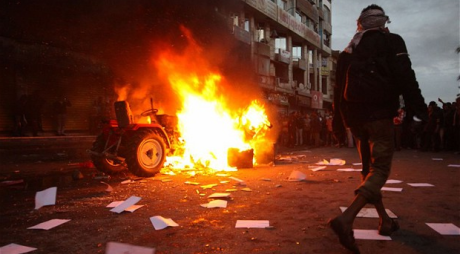Egyptian president ignores social media protesters: A bloody coup is brewing

After over two weeks of street demonstrations against the oppressive regime, the Egyptian president Hosni Mubarak has announced he will not run in September's elections, but will not immediately step down.
Some of his powers will be transferred to his vice president, Omar Suleiman. It is not clear whether the military will implement any changes either.
Democratic elections will be held, Mubarak said during his speech on live state television, and that power will be "transferred to whoever the electorate chooses". But it is clear that minor changes in regime will not be enough to satisfy the growing numbers of people in Tahrir Square.

In only two months, this is the second revolution in the North African and Middle Eastern region, spurred on by social media. First Tunisia, now Egypt. The same two social networks, Twitter and Facebook; the heart and the lifeblood of organising the protests and bringing support to the streets.
The Arab states are understandably worried if the troubles will spread further, with some leaders opting to reshuffle their cabinets to appease their people. The BBC's security correspondent Frank Gardner said the more dynastic governments are putting subsidies and changes in place already to prevent uprising.
Gardner said, "this is the Twitter generation. They know what is going on. They saw what happened in Tunisia, and will not stand idly by".
Young people have been a major focal point during these protests, as key people involved in the social media uprising. "The young generation is bringing about change in Egypt", President Obama said earlier.
"I am not embarrassed to listen to the youth of this country", Mubarak said during his speech, pointing out that the protesters demands "are legitimate".
Though the Internet was cut off from within the country, old style technologies were brought into play with fax machines and dial up networking beating the technological blocks put in place by the government. Mobile voice and data services were disrupted, as well as 3G technology and BlackBerry services.
Vodafone, one of the primary networks in the country, argued that the network was 'hijacked' by the government to send pro-Mubarak text messages, describing them in a statement as "unacceptable". The damage to the networks brand could be irreparable.
The Egyptian army was reluctant to initially take sides, seemingly an act of support for the protesters. We forget that though the army performs a sovereign duty to the executive, its soldiers are still residents and citizens of Egypt nonetheless.
But now that the president has defiantly stated that he will not immediately renounce power, the concern is that the army could react upon its own people.
Even the state run television has seemingly changed its policy on the portrayal of the protests, displaying them in a more truthful and unedited light, rather than quashing the story from the headlines. Yet the Guardian report the current anger post-speech in Tahrir Square is not being reported.
Whether the political modernity will rise from the ashes of the burning flags and effigies, it is yet unclear. However one thing is clear. Enough people on an open, international and democratic platform can bring power back to the hands of the people.
- Read more: Egypt 'shuts down Internet' amid further protests; Facebook web traffic drops
- Read more: How the Internet went out in Egypt
- Related: #Egypt blocked in China: Is Internet access a human right?
- Related: Angry students, social media: The perfect storm for revolution
- Related: Egypt's crisis: where social media threatens global outsourcing
- Related: Google, Twitter, SayNow team to enable voicemail tweets to, from Egypt